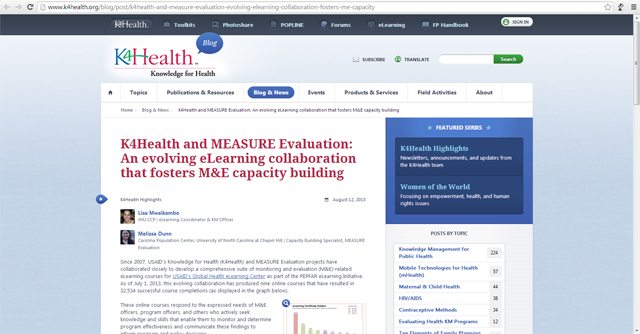M&E eLearning Courses Featured on K4Health Blog

Courses advancing monitoring and evaluation (M&E) professionals’ skills in the field were featured on the Knowledge for Health (K4Health) blog in August 2013. Since 2007, MEASURE Evaluation and K4Health have collaborated to produce nine eLearning courses, which have resulted in 32,534 certificates earned as of July 2013. To obtain a certificate, learners must score 85% or higher on a course’s final exam.
M&E program managers, implementers, and others interested in the content can enroll in the courses at no cost on the U.S. Agency for International Development’s (USAID) Global Health eLearning (GHeL) Center. Courses were created as part of the U.S. President’s Emergency Plan for AIDS Relief (PEPFAR) eLearning Initiative, led by a multi-agency collaboration that includes the USAID Office of HIV/AIDS, Office of the U.S. Global AIDS Coordinator, Centers for Disease Control and Prevention, K4Health, MEASURE Evaluation, and others.
Anyone with an Internet connection can access the courses, allowing health professionals worldwide to participate and learn more about M&E principles. To address the challenge of reaching individuals who may not have consistent Internet connectivity, the courses are mobile accessible, available for download off the GHeL Web site in a variety of formats (e.g., Adobe PDFs, ePub, and Mobi), and have been distributed on CD-ROM to partners and M&E networks in the developing world.
Melissa Dunn of MEASURE Evaluation said K4Health and MEASURE Evaluation’s similar objectives enabled the courses’ success. “It’s a collaboration that has been easy and natural because of our shared vision, goals, and priorities,” said Dunn, a capacity-building specialist. She has worked closely with Lisa Mwaikambo, an eLearning coordinator and knowledge management officer with the Johns Hopkins Bloomberg School of Public Health's Center for Communication Programs. Mwaikambo echoed Dunn’s sentiments that the collaboration has been positive. “The success of the PEPFAR eLearning Initiative–specifically the development of high quality eLearning courses based on the latest evidence and guidance available and making sure that the courses are accessed and used by the target audience–would not have been achieved without strong partnerships, like the one between K4Health and MEASURE Evaluation,” she said.
K4Health also helped MEASURE Evaluation expand the courses’ reach through incorporating them into blended learning interventions, such as encouraging in-person workshop participants to enroll in courses as refresher trainings after the workshops have ended. Courses have also been used as prerequisites for workshops. An example is participants at a 2011 geographic information systems (GIS) training in Rwanda completed the Geographic Approaches to Global Health eLearning course prior to attending. Doing so ensured they all arrived with the same basic level of knowledge, which allowed MEASURE Evaluation workshop trainers to spend more time in person teaching skills necessary to produce GIS maps and analyze and use spatial data.
Even more interested individuals will be able to access key M&E knowledge now that the courses have been translated into French, Portuguese, and Spanish and are available for download from the GHeL Web site.












